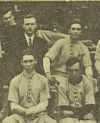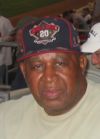Kinston Indians
The Kinston Indians (nicknamed "The K-Tribe") are a minor league baseball team that plays its home games in Kinston, North Carolina. The team is a High-A Classed affiliate of the American League Cleveland Indians. The Kinston team is a member of the Carolina League and competes in the Southern Division of that circuit. Among the cities in the league, only Winston-Salem has been represented for more years than Kinston.
History
Baseball has been popular in Kinston since the late nineteenth century, and it fielded many excellent amateur clubs, but the small city was unable to sustain a viable professional team until the mid-1920's. Earlier attempts included an aborted campaign in the Class D Eastern Carolina League[1] in 1908 and a semi-pro "outlaw league" team in 1921 and 1922. Due to the efforts of the city's business leaders, former local amateur star Elisha Lewis, and former major league pitcher George Suggs[2][3], the town was able to secure a team in the Class B Virginia League[4] for the 1925 season.
Playing in a newly renovated stadium designed by Suggs, Kinston's team, dubbed the "Eagles", quickly found themselves in the cellar. Despite their onfield problems, the team was successful enough at the gate that they proved the town capable of sustaining a professional nine. Kinston enjoyed three years in the Virginia League and then moved on to a newly reformed Eastern Carolina League. This later affiliation would collapse along with the stock market in 1929. Among the members of these 1920's Eagles teams was a young catcher named Rick Ferrell[5] who would have a long playing career and even longer front office career in the major leagues. In 1984, he was inducted into the Baseball Hall of Fame.[6] To this date, he is the only former Kinston player to have been given that honor. Another player, Frank Armstrong, eventually decided that baseball was not for him. He gave up baseball for a career in the armed services and became one of the most decorated generals in the history of the Air Force.
Kinston was without a team for the first few years of the Depression, but by 1934, the city found its way into the semi-professional Coastal Plain League.[7] In 1937, this loop became fully professional and was classified as a Class D league by the National Association. The city would stay in this league every season until it was finally disbanded following the 1952 campaign. It was as a member of this affiliation that Kinston saw some of its finest baseball triumphs including many playoff appearances and two league championships (1935 and 1947). Among the superior talent that entertained the fans of Kinston was a young player named Charlie "King Kong" Keller[8][9] who remains within the top forty major league players of all-time in terms of on-base percentage (.410).
Following the dissolution of the Coastal Plain League, Kinston found itself without a team until the owner of the Burlington Bees of the Carolina League[10] decided to move his team to Kinston for the 1956 season. At the time, the Carolina League was a Class B loop with teams located in Virginia and North Carolina. The new Kinston Eagles were a Pittsburgh Pirates affiliate and featured something never before seen on any of the town's previous nines - black ball players. In these early days of the Civil Rights Movement, the players received much verbal and psychological abuse from the largely white, Southern fan base. One of these first black Kinston ball players, Carl Long, would excel during the 1956 season and set an RBI standard (111) that would never be surpassed by any of the Kinston hitters who have come after him. Unfortunately for Kinston, their owner was an inept businessman who brought the club near bankruptcy before it was moved to Wilson in 1957.
Kinston's re-entry into Carolina League baseball in 1962 was explosive both on the field and at the turnstile. Although they came in second in the standings, the Eagles were able to fly through the playoff competition and claim the first of its Carolina League crowns. At a time when Kinston's population was only 25,000 strong, the ball club was able to attract over 140,000 fans. Part of the lure for these fans was the amazing team supplied by Kinston's parent club, the Pittsburgh Pirates, which included Steve Blass[11][12] (17-3, 1.97 ERA, 209 K's), and Frank Bork[13] (19-7, 2.00 ERA). Another attraction for the fans was that for the first time, the Eagles were a community owned team. The Kinston Eagles Baseball Company was a non-profit organization run by an elected 18 man unpaid board of directors. Profits went back into improving the stadium, promoting the team, and supplying playing equipment for the "youngsters" of Kinston. This arrangement would continue through all thirteen years of Kinston's second tenure in the Carolina League from 1962 through 1974.
With the reclassification of minor league baseball in 1963, the Carolina League became a Class A circuit. The Eagles would fail to win any more championships during this second period of Carolina League play, but they were in the hunt during most seasons and managed to make the playoffs following six of the thirteen seasons. The Pirates stuck with Kinston through the 1965 campaign, and the Eagles were managed by Harding "Pete" Peterson[14] during three of those four seasons. Pete would later oversee the Pirates farm system and become the Pirates' general manager, helping to build the powerful late seventies team that won the World Series. The Eagles became affiliated with the new Atlanta Braves during 1966 and 1967 and were managed by Andy Pafko[15] during those years. From 1968 though 1973, the Eagles had a working relationship with the New York Yankees, and the fans saw a lot of great talent pass through the city including a young Ron Guidry[16][17] who would establish himself as one of the best pitchers in the American League in a few short years. His number has been retired by the Yankees organization and he has been honored with a plaque which hangs at Monument Park in Yankee Stadium.
During the 1970's the popularity of minor league baseball reached its lowest point and the attendance in Kinston fell to only 30,000 for the 1973 season. The city desperately needed a huge shot in the arm to revive interest, and the Expos were turned to in its hour of need. The young Montreal franchise boasted a strong farm system with a lot of talent. So much talent in fact, that they decided to experiment with having two High A affiliates. Instead of dividing the players evenly between the two High A teams, the West Palm Beach club ended up with all the best men while the newly renamed Kinston Expos had to make due with castoffs. The Kinston team soon found itself overmatched among its Carolina League rivals. The Expos fell to last place and attendance fell to only 27,000 for the year. Montreal declared their experiment a failure and withdrew from Kinston following the 1974 season. With no major league sponsor and very little fan support, Kinston withdrew from the league.
Ray Kuhlman had a long and successful career as a pilot for United Airlines, and before that, he had flown dangerous supply missions for the military during World War II. As his flying life was coming to a close in the late seventies, Ray decided to make an investment in baseball with some of the money he had saved. After purchasing a Carolina League franchise, he looked around for a suitable location for it and decided on Kinston. The renamed Kinston Eagles flew unaffiliated their first season back in the circuit in 1978. By the next campaign, they were associated with the Toronto Blue Jays. Toronto stayed with Kinston for seven years, and the team eventually took on the Blue Jay name. Although Kinston did not win any championships during the Blue Jays years, the period is remembered fondly by the fans of today. Ray and his wife Ruth ran the team themselves and oversaw steady annual increases in attendance each year. They brought a fun family atmosphere to the game and helped things along with a string of marketing ideas that have taken hold and remain to this day. These included increased promotional days, fireworks displays, the introduction of Kinston baseball cards, an increase in branded souvenir merchandise, the establishment of the Kinston Professional Baseball Hall of Fame[18], and the hiring of a team mascot. Also putting people in the seats was a formidable collection of future major league stars including Tony Fernandez[19], Fred McGriff[20], and Cecil Fielder.[21]
Following the 1985 season, the Blue Jays decided to part ways with Kinston, and professional baseball in the city seemed to be in doubt once again. There was talk of moving the franchise, but the city remained in the Carolina League with an independent ball club that took on the Eagles name. 1986 proved to be disappointing in the standings and at the gate, and talk of a move was renewed, but ownership secured an affiliation with the Cleveland Indians during the off season. For more than twenty years, Cleveland and the KTribe, as they have come to be known, have enjoyed an extremely successful partnership which has produced fifteen playoff appearances and five Carolina League championships (1988, 1991, 1995, 2004, and 2006) along with an incredible array of major league talent including Albert Belle[22], Bartolo Colon[23], Manny Ramirez[24], Jim Thome[25].
The talent and the wins brought the crowds, as six figure attendance totals became the norm throughout the 90's and into the twenty-first century. Drawing inspiration from the special relationship the team enjoyed with the city during the glory days of the sixties, General Manager North Johnson fostered closer bonds with the mayor's office and helped create the Mayor's Committee for Professional Baseball in 1987. Dedicated to increasing season ticket sales and promoting ties with businesses, the committee accomplished much in a short span of time. Attendance increased by nearly twenty thousand in 1987 and by more than twelve thousand the following year. By 1991, the number of fans through the turnstiles topped 100,000 for the first time since 1964. Although a new ownership group, led by local restaurant owner Cam McRae, purchased the franchise in 1994, continuity in the day-to-day operations has been maintained through general manager North Johnson and front office mainstay Shari Massengill who took over the reins in 2006. Massengill and her assistant general manager, Jessie Hays, form the only all female front office in all of professional baseball. Ties with the local government also remain strong, as prospects for the start of a second century of baseball in 2008 look all but assured with new renovations to the ballpark and a renewed affiliation with Cleveland signed on the dotted line.
Source Materials
- Chrisman, David F. (1988). The History of the Virginia League. Maverick Publications. ASIN B0006EQIN8.
- Gaunt, Robert (1997). We Would Have Played Forever: The Story of the Coastal Plain Baseball League. Baseball America, Inc.. ISBN 0-945-16402-5.
- Johnson, Lloyd, and Miles Wolff (eds.) (1997). The Encyclopedia of Minor League Baseball, second ed.. Baseball America, Inc.. ISBN 0-963-71898-3.
- Sumner, Jim L. (1994). Separating the Men From the Boys: The First Half-Century of the Carolina League. John F. Blair. ISBN 0-895-87112-2.
- various editors (1956-present). Carolina League Record Book. Baseball America. N/A. - Over the years, this publication has also been known as Carolina League Media Guide and Record Book and Carolina League Directory and Record Book



